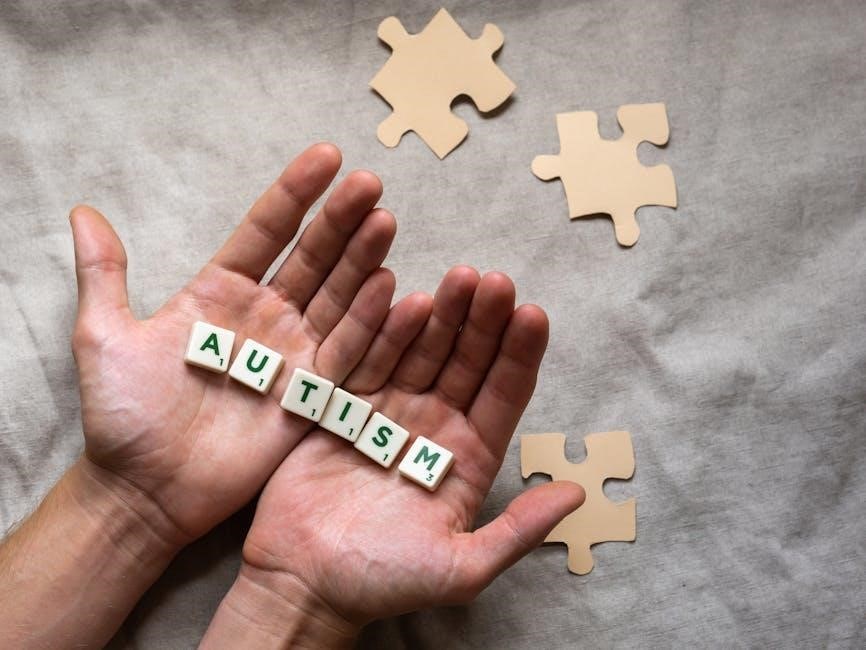Oppositional Defiant Disorder (ODD) is a behavioral condition characterized by angry‚ defiant‚ and vindictive behavior toward authority figures. It significantly impacts a child’s daily interactions‚ impulse control‚ and relationships. While challenging‚ ODD can be managed with structured strategies and support.
Benefits of Using Worksheets for Managing ODD
Worksheets are a valuable tool for managing Oppositional Defiant Disorder (ODD) in children and teens. They provide a structured and systematic way to help individuals identify triggers‚ explore emotions‚ and develop healthier coping strategies. By using ODD worksheets‚ children can gain insight into their rebellious behavior and learn to regulate their emotions more effectively. These resources are often designed by mental health professionals‚ ensuring they address key challenges associated with ODD‚ such as defiance‚ impulsivity‚ and poor communication skills. Worksheets also offer a platform for tracking progress‚ rewarding positive behavior‚ and reinforcing accountability. Additionally‚ many worksheets are adaptable to different settings‚ such as home or school‚ making them a flexible and practical solution for consistent behavioral management. They are often available in printable PDF formats‚ making them easily accessible for parents‚ educators‚ and therapists. Overall‚ worksheets empower both children and caregivers with actionable strategies to improve daily interactions and long-term outcomes.

Popular ODD Worksheets Available in PDF Format
There are various popular worksheets designed to help manage Oppositional Defiant Disorder (ODD) in children and teens. These resources are widely available in PDF format‚ making them easily accessible for printing and use. One of the most commonly used worksheets focuses on emotional regulation exercises‚ which help individuals identify and manage their emotions. Another popular option is behavioral tracking charts‚ which allow parents and educators to monitor progress and reinforce positive behavior. Additionally‚ worksheets aimed at improving communication skills are highly effective‚ as they teach children how to express their needs and feelings constructively. Many of these worksheets are designed by licensed mental health professionals‚ ensuring they are evidence-based and tailored to address specific challenges associated with ODD. Websites like Child Therapy Guide and other educational platforms offer a wide range of free and printable PDF worksheets‚ providing practical tools for managing ODD in various settings. These resources are adaptable and can be customized to meet individual needs‚ making them a versatile solution for caregivers and therapists alike.
Types of Worksheets for ODD
Worksheets for ODD include emotional regulation exercises‚ behavioral tracking charts‚ and communication skills development tools. These resources help identify triggers‚ manage emotions‚ and improve interpersonal interactions‚ providing structured support for children with ODD.
4.1 Emotional Regulation Exercises
Emotional regulation exercises are essential for managing Oppositional Defiant Disorder (ODD) as they help individuals identify and control their emotions. These worksheets often include activities that teach children to recognize triggers‚ understand emotional responses‚ and develop healthy coping mechanisms. By exploring feelings and reactions‚ kids can learn to manage anger and frustration more effectively.
Many worksheets incorporate mindfulness and breathing exercises to promote calmness and self-awareness. These tools encourage children to reflect on their emotions and develop strategies to respond appropriately in challenging situations. Structured exercises also help improve impulse control‚ reducing defiant behaviors over time.

Additionally‚ some worksheets focus on identifying emotional patterns and teaching problem-solving skills. These exercises provide a systematic approach to emotional management‚ helping children with ODD build resilience and improve their interactions with others. Regular practice with these tools can lead to positive behavioral changes and better emotional stability.
4.2 Behavioral Tracking Charts

Behavioral tracking charts are essential tools for managing Oppositional Defiant Disorder (ODD) as they help monitor and document a child’s behavior over time. These charts typically include columns for date‚ time‚ specific behaviors observed‚ and corresponding consequences or rewards. They allow parents‚ educators‚ and therapists to identify patterns‚ triggers‚ and the effectiveness of interventions.

By systematically recording incidents‚ caregivers can pinpoint situations that lead to defiant behavior and develop targeted strategies to address them. These charts also include sections for noting positive behaviors‚ reinforcing good conduct through recognition or rewards. This positive reinforcement encourages children to repeat desirable actions‚ improving their behavior gradually.
Behavioral tracking charts provide consistency and clarity‚ helping children understand expectations and consequences. They are widely available as printable PDFs‚ making them accessible for both home and school use. Regular use of these charts can lead to significant reductions in oppositional behaviors‚ fostering a more cooperative and respectful attitude in children with ODD.
4.3 Communication Skills Development
Communication skills development is a critical component of managing Oppositional Defiant Disorder (ODD)‚ as many children with this condition struggle with expressing their emotions and needs effectively. Worksheets designed for communication skills focus on teaching active listening‚ using “I” statements‚ and identifying emotions to reduce misunderstandings and conflicts.
These worksheets often include exercises that help children recognize and articulate their feelings‚ which can prevent escalation of defiant behaviors. Activities such as creating emotion charts‚ role-playing conversations‚ and practicing empathy are common. By improving communication‚ children with ODD can better navigate social interactions and build stronger relationships with peers and authority figures.
Therapists and educators often recommend these worksheets as they provide a structured and engaging way to develop essential life skills. Over time‚ enhanced communication can reduce oppositional behaviors‚ leading to a more cooperative and positive demeanor in children with ODD.

Implementing Worksheets Effectively
Implementing worksheets for managing Oppositional Defiant Disorder (ODD) requires a structured and consistent approach to maximize their effectiveness. Parents‚ educators‚ and therapists should introduce these tools in a calm and supportive environment‚ ensuring the child understands their purpose and feels comfortable engaging with them.
Consistency is key; setting a regular routine for completing worksheets helps establish a sense of predictability‚ which can reduce resistance. Positive reinforcement‚ such as praise or small rewards‚ can motivate children to participate actively. It’s also important to tailor the worksheets to the child’s specific needs and developmental level.
Starting with simple exercises and gradually increasing complexity can help build confidence and skill mastery. Involving both parents and educators ensures a unified approach‚ reinforcing the lessons learned from the worksheets across different settings.
By combining worksheets with other therapeutic strategies‚ such as behavioral therapy or mindfulness practices‚ their impact can be further enhanced‚ leading to more positive behavioral changes over time.

Free Printable Resources for ODD Worksheets
Accessing free printable resources for Oppositional Defiant Disorder (ODD) worksheets is a convenient and cost-effective way to support children with behavioral challenges. Websites like Child Therapy Guide and Therapist Aid offer a variety of downloadable PDF worksheets tailored to address specific aspects of ODD‚ such as emotional regulation‚ behavioral tracking‚ and communication skills.
These resources often include behavior charts‚ activity sheets‚ and exercises designed to help children identify triggers‚ manage emotions‚ and develop positive coping strategies. Many worksheets are created by licensed professionals‚ ensuring they are both effective and evidence-based.
In addition to dedicated therapy websites‚ platforms like Pinterest provide inspiration and printable materials for managing ODD. Some worksheets are even editable‚ allowing customization to meet individual needs. Free resources make it easier for parents‚ educators‚ and therapists to implement structured interventions without financial barriers.
By leveraging these free printable resources‚ caregivers can create a supportive environment that fosters growth and positive behavioral change in children with ODD.

Therapeutic Approaches Using Worksheets
Therapeutic approaches using worksheets play a crucial role in managing Oppositional Defiant Disorder (ODD). These tools are designed to help children identify and understand their emotions‚ behaviors‚ and triggers. Worksheets often incorporate techniques from Cognitive Behavioral Therapy (CBT)‚ such as identifying negative thought patterns and developing more positive responses.
Additionally‚ mindfulness and breathing exercises are frequently included to teach emotional regulation. Behavioral tracking charts allow children to monitor their progress‚ fostering a sense of accountability and self-awareness. Communication skills development is another key area‚ with activities aimed at improving interpersonal interactions and reducing conflict.
Worksheets also provide a structured platform for exploring the underlying causes of defiant behavior‚ helping children and therapists work collaboratively to develop healthier coping mechanisms. By integrating these therapeutic approaches‚ worksheets offer a comprehensive and effective method for addressing ODD symptoms and promoting long-term behavioral change.

Case Studies and Success Stories
Case studies and success stories highlight the effectiveness of worksheets in managing Oppositional Defiant Disorder (ODD). For instance‚ a 10-year-old boy with ODD showed significant improvement in emotional regulation after using worksheets focused on identifying triggers and coping strategies. His defiance decreased‚ and positive behaviors increased‚ as documented in a behavioral tracking chart.
Another success story involves a teenager who struggled with authority figures. Through worksheets on communication skills and problem-solving‚ she learned to express her feelings calmly and resolve conflicts more effectively. Her relationships with teachers and parents improved noticeably.
These examples demonstrate how structured worksheets can empower children and teens with ODD to develop better self-control and interpersonal skills. By providing tangible tools for emotional and behavioral growth‚ worksheets contribute to lasting positive changes in individuals with ODD.
Worksheets play a central role in managing Oppositional Defiant Disorder (ODD) by providing structured tools for emotional regulation‚ behavioral tracking‚ and communication skill development. They offer a practical and accessible way to address the challenges of ODD‚ helping children and teens develop self-awareness and resilience.
By using worksheets‚ individuals with ODD can identify triggers‚ practice coping strategies‚ and improve their interactions with others. The availability of free‚ printable resources in PDF formats makes these tools widely accessible to parents‚ educators‚ and therapists. Over time‚ consistent use of worksheets can lead to significant improvements in behavior and emotional well-being.

